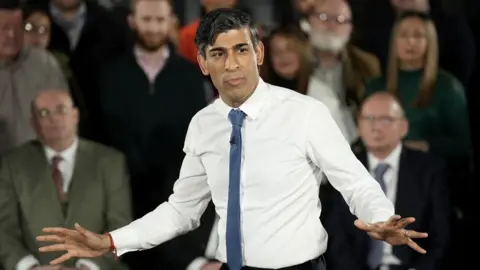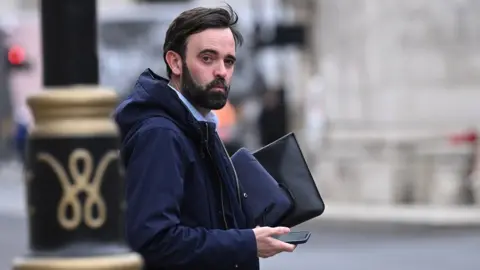Can Rishi Sunak halt growing Tory poll panic?
 Getty Images
Getty ImagesFor all the near-apocalyptic warnings of possible government defeat, Rishi Sunak's Rwanda Bill this week cleared the House of Commons by a comfortable margin.
But despite this clear moment of triumph for the prime minister and his team, there were times when his political authority felt more fragile than expected.
That's not wholly, or perhaps even mostly, about Rwanda. For this was also a week in which Conservative MPs faced reminder after reminder of their own political mortality.
On Monday the Telegraph wiped out its front page for a 14,000-person general election poll by YouGov. Using its MRP model to project results in each constituency, the pollster found that Labour are on course for a 120-seat majority.
(MRP stands for "multi-level regression and post-stratification" - a relatively new polling method that is meant to provide more accurate predictions of results in individual seats).
For plenty of Conservative MPs, while uncomfortable, the Telegraph poll was not revelatory. "It's not really any different to the other polls," one minister who would lose their seat under the model said. "I'm no more worried than I have been."
'Vague mantra'
Not everyone was so relaxed. "Some of my colleagues seemingly didn't realise what the national polling means for them until they looked at their seat in the MRP," another MP recounted.
From Downing Street's point of view it was fortuitous that their election guru, Isaac Levido, was already scheduled to brief Conservative MPs on Monday evening, talking them through a presentation he had given the cabinet over dinner at No 10 the previous night.
Mr Levido, who also ran Boris Johnson's victorious 2019 election campaign, told the 120 or so Conservatives at the briefing that YouGov's MRP model was "just another poll", and the idea it is especially authoritative "is just false".
That consoled some MPs, but Mr Levido's address was far from a pep talk.
The opening slide was a graph tracking the opinion polls over the past year.
"It didn't take long looking at it to see that the red line and blue line have both been basically flat, that the gap between them is very substantial and that it's improbable or even incredible that the two lines could cross over again," one despondent ex-minister said afterwards.
"There's too much of a gap."
 Getty Images
Getty ImagesMr Levido told Conservative MPs that he had a plan to turn things around.
That plan is for Rishi Sunak to tell the public that he has a plan - whereas Sir Keir Starmer and Labour would "take the country back to square one". It was a mantra to which the prime minister returned again and again this week, most notably in Thursday's press conference about the Rwanda bill.
Some MPs are relieved to have a clear, easily-repeated message they can repeat on the doorstep. One minister enthused about the "vague" mantra, onto which different voters will be able to "project their own fears" about a Labour government.
Back from the brink
Others admit to a bit of political whiplash: just a few months ago an entire party conference was dedicated to casting Mr Sunak as an agent of change. Mr Levido pre-empted this criticism in his presentation, saying that the Conservatives are still offering change, but that in order to make change "you have to have a plan first".
He likened the Conservatives' pitch to a New Year's resolution, saying that to achieve change yourself you don't just need to set a goal - you need a plan for accomplishing it too.
In the Rwanda votes which dominated the rest of the political week it was never quite clear that the potential rebels had a goal, or a plan.
Ultimately, they were split on the question of whether it was better to have legislation they consider imperfect or to kill Mr Sunak's version of the bill altogether, with most opting for the former.
Many of those who stepped back from the brink were worried about the consequences of defeating the government, particularly that it might precipitate a leadership crisis or even a general election. That is not what Conservative MPs want when they are so far behind in the polls.
And yet despite Mr Sunak's parliamentary success this week the severe political headwinds mean there is just the slightest whiff of a threat to his leadership.
Despite the right's eventual retreat - "the rebels look like idiots", was one senior backbencher's pithy assessment - it will concern Downing Street that at least 60 MPs declared through their votes that they want Mr Sunak to go further on immigration policy.
"The disquiet and distrust has certainly grown," was one former whip's assessment of the week.
'Starting to panic'
Even one strong supporter of the prime minister wondered why Mr Sunak had not been more publicly emollient to the rebels, as he was last month when he allowed them to parade into Downing Street to discuss the bill, accusing him of adopting an "I'm cleverer than you attitude".
Others discount this criticism, saying Mr Sunak's faith that his version of the bill was the only workable one was what allowed him to keep the other wing of his party on side.
What now?
Westminster's favourite parlour game - "how many letters of no confidence have been submitted to Sir Graham Brady?" - is up and running again.
The chairman of the backbench 1922 committee is the Tory MP who organises leadership contests.
All claims about the number of letters sent to him are impossible to verify, prove or disprove.
But however many are already submitted, MPs say it is inevitable the number will grow after the local elections in May, where if the polling does not change many Conservatives are expecting to do very badly indeed.
The threshold for triggering a confidence vote in Mr Sunak's leadership is 53 MPs - fewer than the number who rebelled on Rwanda this week.
So after a week of parliamentary progress, Mr Sunak may need clear evidence of political progress to keep a lid on his regicidal party for much longer.
"Some people are already starting to panic," a Tory MP said.
"It's not just the usual suspects, there's quite a lot of people now.
"It's easy to dismiss one MRP poll but when it's on the back of lots of other polls people find batting that away quite hard. The accumulation of despondency may become too much".
